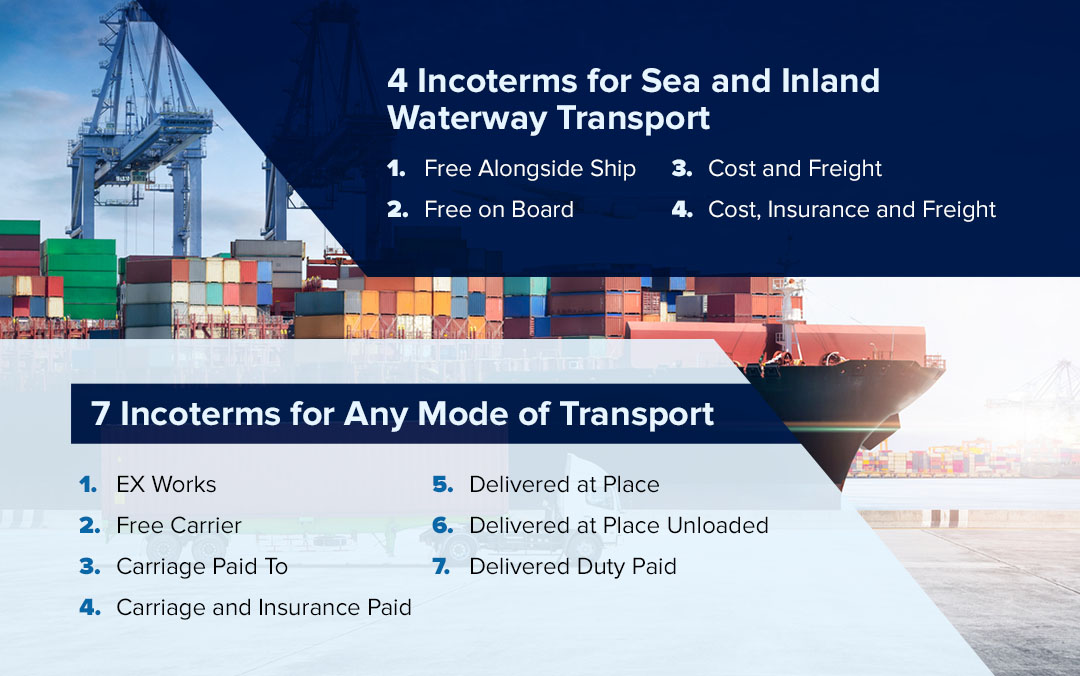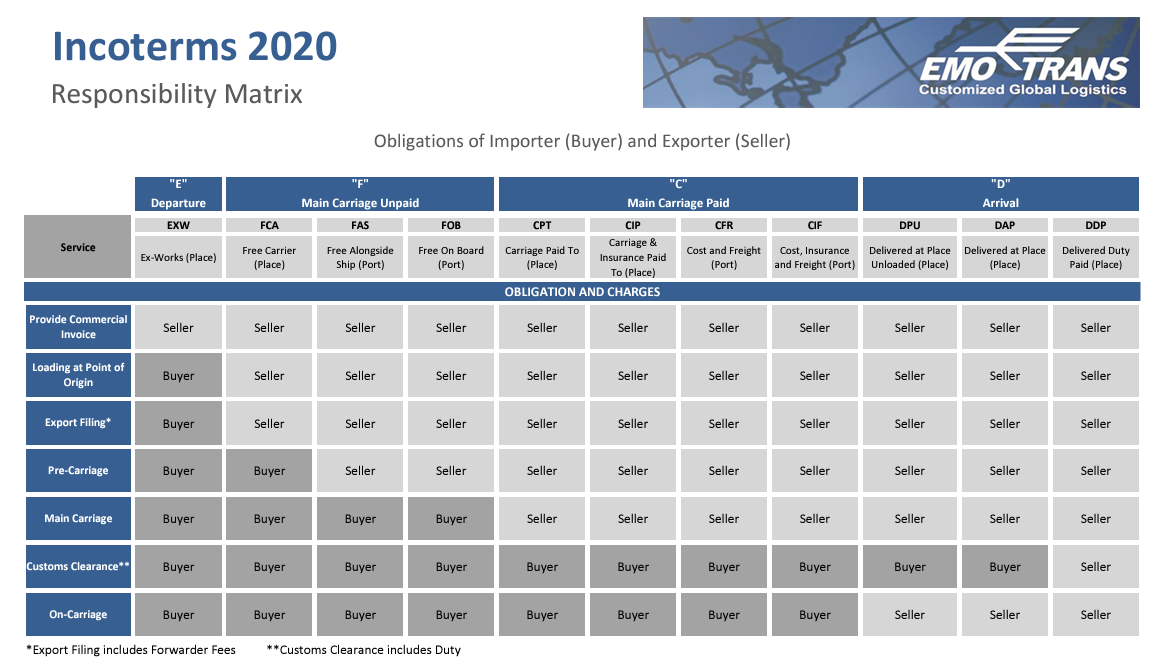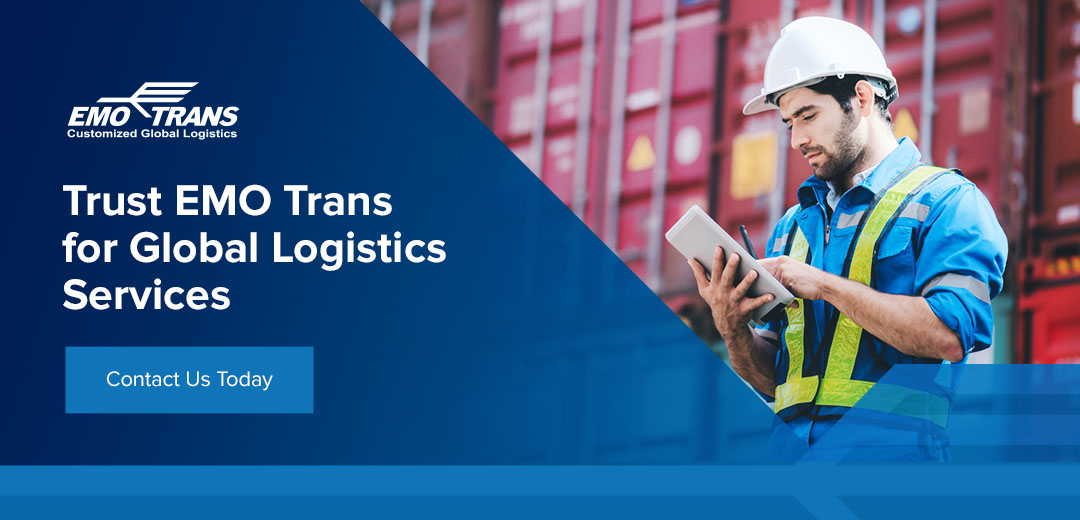
International commercial terms, popularly Incoterms, are globally recognized conditions that clarify buyers’ and sellers’ obligations in foreign trade. These terms standardize and minimize ambiguity in international trade agreements and eliminate the need for attorneys to draft trade contracts, saving you time and money.
Domestic and international traders use Incoterms when importing or exporting goods. They simplify foreign transactions by defining tasks, costs and risks. They define each party’s responsibilities, the transactional steps and terms that apply to the business arrangements. Let’s learn more about what Incoterms do and when they apply.
What Are Incoterms?
Incoterms are rules developed by the International Chamber of Commerce in 1936 to guide international trade transactions. These contractual terms and obligations promote global economic prosperity and open markets. The ICC reviews and amends Incoterms every decade to adapt to changing global markets — the latest update was in 2020.
Incoterms define essential trading conditions, including who is responsible for paying and managing the shipment, logistics, insurance, documentation and customs clearance between the buyer and seller. While Incoterms are not laws, they are legally binding when used in a trade contract, and both parties must mention the relevant Incoterms in the contract.
What Are the 11 Incoterms?
The 2010 Incoterms update involved classifying the 11 rules into two categories based on the modes of transport involved in Incoterms shipping. Most terms fit into the category that specifies the terms for any mode of transport, while the rest apply to sea, land or inland waterway transport.

7 Incoterms for Any Mode of Transport
Here are the seven Incoterms examples that apply to any mode of transport.
- EX Works: Under this Incoterm, the seller is responsible for making the goods available for collection at their business premises or another specified location. The buyer takes on all the risks and costs associated with transportation and shipping.
- Free Carrier: The seller provides the goods at their risk and expense on their business premises or an agreed-upon location. They’re also responsible for clearing the goods for export — the buyer takes on the risks and costs afterward.
- Carriage Paid To: The seller assumes the risk and expenses of making the goods available for the buyer at their business premises or an agreed-upon location, plus the costs of delivering the goods to the buyer.
- Carriage and Insurance Paid: In addition to the previous three terms, the seller is responsible for delivering goods to the buyer and paying high-coverage ratio insurance.
- Delivered at Place: Under this Incoterm, the seller assumes the risks and costs for transporting goods until they reach an agreed-upon location, at which point the risks and costs pass to the buyer.
- Delivered at Place Unloaded: The DPU dictates that the seller bears the goods’ entire risk and transportation costs until they arrive at a specified port or terminal. After unloading, the risks and shipping costs to the final destination shift to the buyer.
- Delivered Duty Paid: Under the DPP Incoterm, the seller assumes all the risk and shipping costs, including export costs at the shipping port and import duties at the destination.
4 Incoterms for Sea and Inland Waterway Transport
The following four Incoterms apply to trade transactions on sea, land and inland waterways.
- Free Alongside Ship: The FAS Incoterm dictates that the seller assumes all the costs and risks, including export duties, until the goods move to the next ship. Then, the risks, export and import clearance costs transfer to the buyer.
- Free on Board: The FOB shipment terms indicate that the seller is responsible for the risks and costs of delivering goods to a designated ship nominated by the buyer. After that, the risks and costs shift onto the buyer.
- Cost and Freight: The seller is responsible for transporting the goods by sea to a destination port. The buyer assumes responsibility and pays for import costs and duties once the goods are aboard the delivery vessel.
- Cost, Insurance and Freight: The CIF Incoterms name the seller responsible for delivering the goods to a designated port, assuming the transportation, insurance and loading costs onto a specified vessel. The costs and risks shift to the buyer after the goods are on the designated vessel.
What Do Incoterms Not Cover?
While Incoterms are a vital part of defining export contracts, they do not cover some specific sale conditions. Some trade agreement conditions you won’t find within Incoterms include:
- The identity of the goods for sale
- The selling price
- When the payment is due
- Acceptable payment methods
- When the title or ownership passes from the seller to the buyer
- The conditions that lead to a breach of contract or product liability
- Who is liable for a failed or delayed delivery
- The documents needed to facilitate the customs clearance process

Incoterms 2020 vs. 2010
As mentioned earlier, the International Chamber of Commerce revisits and updates Incoterms every decade. The most recent Incoterms revision was in 2020. The past two Incoterms updates are similar, but here are some notable changes the ICC made.
- The ICC changed the 2010 Incoterm Delivered at Terminal to Delivered at Place Unloaded in 2020. With the update, a seller can deliver their goods to a specified dock or terminal or another point that facilitates loading, like a warehouse or factory.
- Though Incoterms 2010 assumed third-party carriers provided all transport services, Incoterms 2020 accounts for situations where sellers or buyers use their preferred transportation method.
- With the update to the Free Carrier Incoterm, buyers must now remind their carriers to issue a bill of lading with an onboard notation to the seller to meet the terms on a letter of credit.
- The 2020 revision to the Carriage and Insurance Paid Incoterm requires the sellers to take out comprehensive transport insurance.
- The updated Incoterms 2020 dictate buyers’ and sellers’ import and export security cost requirements.
You can use either the 2010 or the 2020 Incoterms for your trade contracts, but you must agree on which version to use and stick to that.
Trust EMO Trans for Global Logistics Services
Incoterms can challenge buyers and sellers involved in international trade transactions. Outsourcing logistics and transport services to professionals will ensure smoother transactions and compliance with local government agencies and international regulatory bodies. EMO Trans is a global logistics company with extensive knowledge of Incoterms and other logistics conditions, thanks to our five decades of experience.
Our compliance consultants can help you draft favorable trade agreements and contracts to prevent regulatory violations and costly charges. We have solid infrastructure and expertise to deliver outstanding services to our customers. Contact us today to learn how we can help you create better trade contracts.


